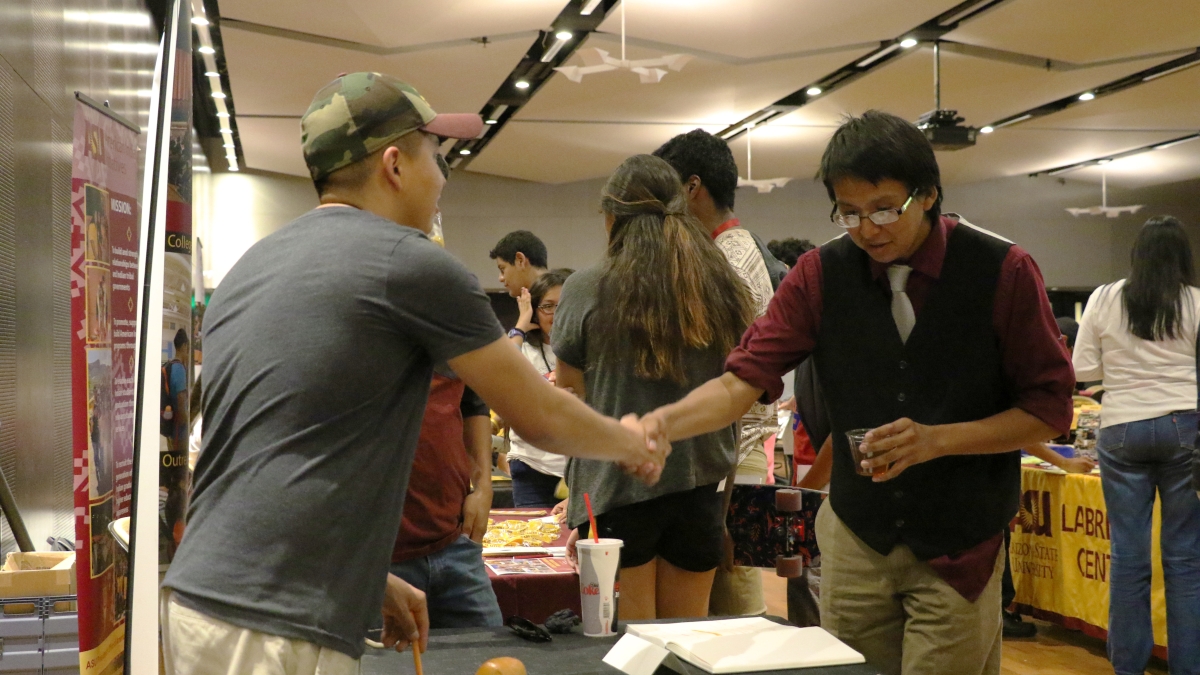It’s just a little over one month into the fall semester at Arizona State University, but many first-year students who participated in ASU’s SPIRITSPIRIT stands for the Student Preparedness Initiative: Readiness Inspired by Tradition program for Native students are already feeling nicely settled in.
Valentina Clitso, who came to ASU to major in astronautics in the Ira A. Fulton Schools of Engineering and pursue her interest in building new devices to mine asteroids, said she has worked out a study routine that is going well for her.
“I’ll do my calculus homework at a math tutoring center and study chemistry in the building where my professor holds office hours,” said Clitso, a graduate of Monument Valley High School in Kayenta, Arizona, and a Gates Millennium Scholar.
“For other courses I might go to the SDFCSun Devil Fitness Center to study, where I can relax my mind for a while and work out when I want take a break,” she said. “At night, a friend who’s also an engineering major and I will study together in our rooms.”
Jalen Brady, an architectural studies major in the Herberger Institute for Design and the Arts, has become active in the Construction in Indian Country Student Organization (CIICSO), which hosted an informational and social event as part of SPIRIT 2015.
Brady traveled to Window Rock with several other CIICSO members to represent the group at the 69th annual Navajo Nation Fair and parade on Sept. 12 — where he also donned the official Sparky costume.
“Never did I think I’d ever be representing ASU as the mascot!” Brady, a graduate of Winslow (Arizona) High School, said with a laugh.
Clitso and Brady are two of 72 students in ASU’s 2015 SPIRIT cohort. This early-start program coordinated by American Indian Student Support Services at ASU gives students two weeks to acclimate to the university, connect with friends and mentors, and learn about resources and student organizations before classes begin. The SPIRIT acronym is short for “Student Preparedness Initiative: Readiness Inspired by Tradition.”
Nourishing sense of purpose, community
“Our hope is that each and every Native student who enrolls in ASU will graduate, so in the SPIRIT program we try to touch on all the pieces that students need to know to be successful,” said Laura Gonzales-Macias, associate director of American Indian Student Support Services, which serves ASU’s 2,500-plus Native students in offices on ASU’s Tempe, Downtown Phoenix, Polytechnic and West campuses.
“In our individual interactions with students and in the programs we offer across ASU throughout the year, we stress the importance of making sure that intellectual, emotional, physical well-being, and spiritual needs are all given attention,” Gonzales-Macias said.
“Purpose was a huge theme in this year’s SPIRIT program. When students feel grounded and have a sense of purpose and passion for their major and career path, they recognize that there is meaning behind what they are doing — for them, their families and their communities — that helps them focus on academics and persist.”
The first cohort of SPIRIT students in 2014 had a 7.1 percent higher retention rate than their first-time freshmen peers who didn’t attend the program. Recognizing the benefits of the program, scholarship offices within many tribal communities have been encouraging and even requiring their ASU-bound graduates to attend SPIRIT.
The 2015 program featured more than 30 presentations and workshops by alumni, Native graduate students, staff and administrators from many ASU student-support units and representatives from student organizations. There were social activities some evenings; Red Ink literary magazine even sponsored an open mic night. Current students served as peer ambassadors throughout the program.
SPIRIT participants also completed the one-week course ASU 19, designed to set them up for academic success by introducing tools and processes that will support their academic journey (all the way to graduation in 2019), including electronic tools such as Blackboard, Digication e-portfolio, and Writing Pal. They completed an argumentative writing assignment and practiced attending office hours.
We are committed to creating an environment where you can be successful — as a student, family member and tribal member — and can concentrate on your studies.
Matthew Yatsayte, a sociology major, was one of many in the 2015 SPIRIT cohort feeling a step ahead because of this particular SPIRIT module.
“We started using Digication e-portfolio in a number of courses once the semester started, and it’s been great already knowing how to navigate that technology and already having created a personal portfolio,” Yatsayte said.
A graduate of Rehoboth Christian School in New Mexico, he delayed college for a year when he was offered the chance to work as part an advancement team for his alma mater.
“We traveled from Michigan, to Iowa, to Washington, Colorado and Texas, meeting with people to share the history of the school, and I got to talk about Zuni history. I also managed a call center for a phone-a-thon,” Yatsayte said.
The experience prepared him for going away from home for college, but he says he still appreciated the adjustment period that SPIRIT provided: “That two weeks of learning the campus and where to find staff and resources were great. I also appreciated the hands-on opportunities to apply for scholarships,” Yatsayte said. “I had time to get my room in order — I wasn’t quite sure what to bring and arrived pretty minimalist!”
Natives Connecting @ ASU
For new transfer students and first-year students who were not able to attend SPIRIT, American Indian Student Support Services organized the Natives Connecting @ ASU resource fair the second week in September.
More than two dozen ASU programs and community-interest groups staffed tables at the event, representing professional organizations, academic-success programs, unique service and learning opportunities and other groups where students might make connections in meaningful ways.
Special Advisor to the President on American Indian Affairs Bryan Brayboy, in his welcoming remarks at the event, emphasized that ASU takes its responsibility to tribal nations seriously.
“We are committed to creating an environment where you can be successful — as a student, family member and tribal member — and can concentrate on your studies,” Brayboy said.
He urged students to read President Michael Crow’s recent statement reaffirming ASU’s Commitment to American Indian Tribes.
“It’s a powerful statement, unprecedented for a university really, recognizing that ASU is on ancestral tribal lands and reaffirming ASU’s commitment to serve tribal communities and support American Indian and Alaska Native students in an environment conducive to achieving your dreams,” said Brayboy, who is President’s Professor of Indigenous Education and Justice in the School of Social Transformation and also directs the Center for Indian Education.
“Learn but also have fun. Call us, email, drop in, let us know how we’re doing. And remember, there are also support sources for you at home. Rely on messages from your ancestors, mamas, dads, aunties and uncles for strength,” Brayboy said. “I’m always calling my mama, aunties and uncles for support.”
To promote continual dialogue with indigenous students, Brayboy has invited all Native students to join him for an informal “Breakfast With Bryan Brayboy” session this semester at the American Indian Student Support Services offices on ASU’s Downtown Phoenix, Polytechnic, Tempe and West campuses.
The first, held last Thursday at the Tempe campus, was over-subscribed and very successful. Four of the six remaining breakfasts scheduled for fall are already at capacity. (For more information, visit https://aisss.asu.edu.)
“We want to know, what is it like to be a Native student at ASU?” Brayboy said. “What’s friendly and what isn’t? What might be getting in the way of your success? We want to hear from students how we can do better by you.”
American Indian Student Support Services is a unit of ASU's University College.
More Sun Devil community

Tested tips for taking exams
With May quickly approaching, many students are starting to prep for their most important tests of the year — final exams.Toni Miceli, the inaugural director of the bar exam success program at…

School of Transborder Studies celebrates 15th anniversary
During the summer before his freshman year at Arizona State University, Salvador Macias participated in the AGUILA Youth Leadership Institute, a college access organization designed to help young…

Barrett program unlocks study abroad for first-year honors students
Twenty first-year students from Barrett, The Honors College at Arizona State University are spending their second semester studying abroad in Rome, Italy.Traveling in a tight-knit honors community…




